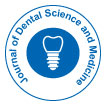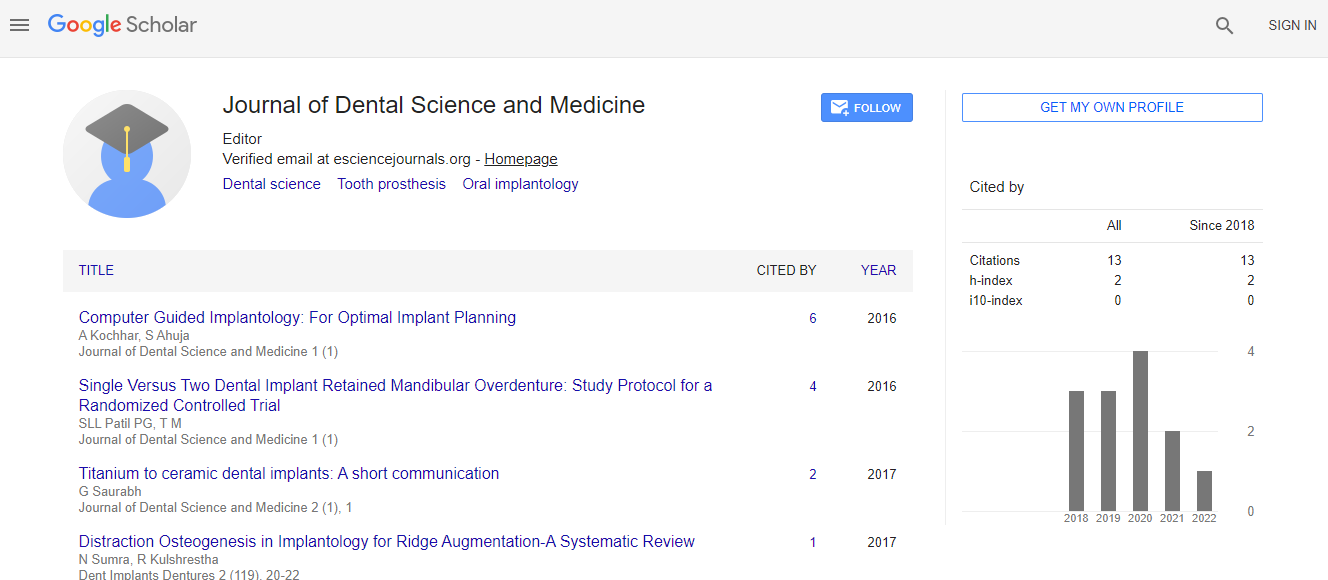Our Group organises 3000+ Global Conferenceseries Events every year across USA, Europe & Asia with support from 1000 more scientific Societies and Publishes 700+ Open Access Journals which contains over 50000 eminent personalities, reputed scientists as editorial board members.
Open Access Journals gaining more Readers and Citations
700 Journals and 15,000,000 Readers Each Journal is getting 25,000+ Readers
Google Scholar citation report
Citations : 13
Journal of Dental Science and Medicine received 13 citations as per Google Scholar report
Indexed In
- RefSeek
- Hamdard University
- EBSCO A-Z
- ICMJE
Useful Links
Recommended Journals
Related Subjects
Share This Page
Clinical Applications of Lasers in Dentistry
3rd Annual Modern Dentistry, Dental Practice and Research Congress & 3rd International Conference on Dental Public Health and Dental Diseases
Dr.Vinisha Pandey
Associate Professor, Endodontist and Laser Specialist
ScientificTracks Abstracts: Dental Science and Medicine
Abstract
The word ��?LASER��? conjures in the mind��?s eye many aspects of what might be described as ��?modern��? life. The words ��?powerful��?, ��?precise��? and ��?innovative��? complement our conception of the word in terms of technology whereas patients often associate the terms ��?magical��? and ��?lightening quick��? with the use of lasers.[1, 2, 3] The word ��?Laser��? is an acronym for Light amplification by stimulated emission of radiation. It is a technology that can amplify and produce a highly directional, intense, monochromatic and coherent beam. [4] LASER is the mightier new ��?avatar� of light. The wonder beam has penetrated into normal life, more than any other form of concentrated energy.[4 ] Today, laser is familiar to everyone because of its multifarious nature - be it in medicine, communication, industry/defense etc. almost anything and everything.[4] Lasers were first developed in the 1960��?s, and research into their applications in dentistry began soon thereafter. Early lasers were continuous wave devices with non contact delivery that were found to be too hot for practical dental use. In the early 1980��?s, short- pulsed, fiber optic contact delivery laser technology was developed. Further technologic advances have led to smaller laser units such as Nd: YAG and diode lasers.[5] In the past 15 years, dental lasers have had a huge growth in practical dental applications. Currently there are 20 specific indications, both soft tissue and hard tissue for use of a variety of dental lasers. However, no one device can accomplish all the practical dental uses. There has been continued growth in this new and maturing field of dentistry.[5] Research is still ongoing in areas of caries prevention and areas of optical coherence tomography for un-destructive imaging of enamel and dentin to determine lesion progression over time.[5] The decision to include laser in everyday dental care will depend not only on financial consideration, as to how their use enhances practice profitability, the greatest factor in making that decision will be an understanding of now laser wavelength interact with oral tissue, together with a appreciation of now their use can improve patient management.[6] Lasers have a widespread applications in dentistry. An essential condition for the proper and successful use of lasers in ant specialty is an understanding of the characteristics and limitations of wavelengths, interaction with tissues, mode of transmission, delivery systems and settings. The presentation aims to introduces lasers through a clinicians point of view and further augments the information by citing the studies done in different aspects of dentistry. From diagnosing a simple caries to the treatment of the most complex lesions or pathologies, lasers are by far the best as compared to conventional techniques.Biography
Vinisha is MDS in Conservative Dentistry and Endodontics. She acquired proficiency in Dental lasers from University of California, San Francisco. Her journey was nerve-racking and had lots of hurdles to get through. All the hardships she faced never made her lose the charisma and the shyness that she had somewhere in the corner of her heart. She has accomplished her dream of rising as an Entrepreneurial Dentist. She has set her focus on oral health, extending utmost personal attention to the individual needs of her patients. Her USP is the painless treatment and laser dentistry that her patients are fortunate to experience.

 Spanish
Spanish  Chinese
Chinese  Russian
Russian  German
German  French
French  Japanese
Japanese  Portuguese
Portuguese  Hindi
Hindi 